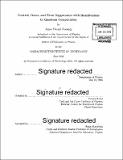Control, gates, and error suppression with Hamiltonians in quantum computation
Author(s)
Bookatz, Adam Darryl
DownloadFull printable version (8.388Mb)
Other Contributors
Massachusetts Institute of Technology. Department of Physics.
Advisor
Edward Farhi.
Terms of use
Metadata
Show full item recordAbstract
In this thesis we are primarily interested in studying how to suppress errors, perform simulation, and implement logic gates in quantum computation within the context of using Hamiltonian controls. We also study the complexity class QMA-complete. We first investigate a method (introduced by Jordan, Farhi, and Shor) for suppressing environmentally induced errors in Hamiltonian-based quantum computation, involving encoding the system with a quantum error-detecting code and enforcing energy penalties against leaving the codespace. We prove that this method does work in principle: in the limit of infinitely large penalties, local errors are completely suppressed. We further derive bounds for the finite-penalty case and present numerical simulations suggesting that the method achieves even greater protection than these bounds indicate. We next consider the task of Hamiltonian simulation, i.e. effectively changing a system Hamiltonian to some other desired Hamiltonian by applying external time-dependent controls. We propose protocols for this task that rely solely on realistic bounded-strength control Hamiltonians. For systems coupled to an uncontrollable environment, our approach may be used to perform simulation while simultaneously suppressing unwanted decoherence. We also consider the scenario of removing unwanted couplings in many-body quantum systems obeying local system Hamiltonians and local environmental interactions. We present protocols for efficiently switching off the Hamiltonian of a system, i.e. simulating the zero Hamiltonian, using bounded-strength controls. To this end, we introduce the combinatorial concept of balanced-cycle orthogonal arrays, show how to construct them from classical error-correcting codes, and show how to use them to decouple n-qudit l-local Hamiltonians using protocols of length at most O(l-1 log n). We then present a scheme for implementing high-fidelity quantum gates using a few interacting bosons obeying a Bose-Hubbard Hamiltonian on a line. We find high-fidelity logic operations for a gate set (including the CNOT gate) that is universal for quantum information processing. Lastly, we discuss the quantum complexity class QMA-complete, surveying all known such problems, and we introduce the "quantum non-expander" problem, proving that it is QMA-complete. A quantum expander is a type of rapidly-mixing quantum channel; we show that estimating its mixing time is a co-QMA-complete problem.
Description
Thesis: Ph. D., Massachusetts Institute of Technology, Department of Physics, 2016. Cataloged from PDF version of thesis. Includes bibliographical references.
Date issued
2016Department
Massachusetts Institute of Technology. Department of PhysicsPublisher
Massachusetts Institute of Technology
Keywords
Physics.